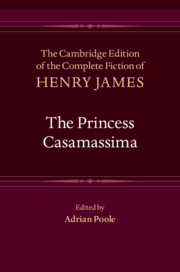Book contents
- Frontmatter
- Contents
- List of Illustrations
- Acknowledgements
- List of Abbreviations
- General Editors’ Preface
- General Chronology of James’s Life and Writings
- Introduction
- Textual Introduction
- Chronology of Composition and Production
- Bibliography
- The Princess Casamassima
- Glossary of Foreign Words and Phrases
- Notes
- Textual Variants I: Substantive Variants up to Copy Text
- Textual Variants II: Substantive Variants after Copy Text
- Emendations
- Appendix: Preface to New York Edition
XLIII
Published online by Cambridge University Press: 11 April 2021
- Frontmatter
- Contents
- List of Illustrations
- Acknowledgements
- List of Abbreviations
- General Editors’ Preface
- General Chronology of James’s Life and Writings
- Introduction
- Textual Introduction
- Chronology of Composition and Production
- Bibliography
- The Princess Casamassima
- Glossary of Foreign Words and Phrases
- Notes
- Textual Variants I: Substantive Variants up to Copy Text
- Textual Variants II: Substantive Variants after Copy Text
- Emendations
- Appendix: Preface to New York Edition
Summary
“My child, you are always welcome,” said Eustache Poupin, taking Hyacinth's hand in both his own and holding it for some moments. An impression had come to our young man, immediately, that they were talking about him before he appeared and that they would rather have been left to talk at their ease. He even thought he saw in Poupin's face the kind of consciousness that comes from detection, or at least interruption, in a nefarious act. With Poupin, however, it was difficult to tell; he always looked so heated and exalted, so like a conspirator defying the approach of justice. Hyacinth contemplated the others: they were standing as if they had shuffled something on the table out of sight, as if they had been engaged in the manufacture of counterfeit coin. Poupin kept hold of his hand; the Frenchman's ardent eyes, fixed, unwinking, always expressive of the greatness of the occasion, whatever the occasion was, had never seemed to him to protrude so far from his head. “Ah, my dear friend, nous causions justement de vous,” Eustache remarked, as if this were a very extraordinary fact.
“Oh, nous causions — nous causions!” his wife exclaimed, as if to deprecate an indiscreet exaggeration. “One may mention a friend, I suppose, in the way of conversation, without taking such a liberty.”
“A cat may look at a king, as your English proverb says,” added Schinkel, jocosely. He smiled so hard at his own pleasantry that his eyes closed up and vanished — an effect which Hyacinth, who had observed it before, thought particularly unbecoming to him, appearing as it did to administer the last perfection to his ugliness. He would have consulted his interests by cultivating immobility of feature.
“Oh, a king, a king!” murmured Poupin, shaking his head up and down. “That's what it's not good to be, au point où nous en sommes.”
“I just came in to wish you good-night,” said Hyacinth. “I’m afraid it's rather late for a call, though Schinkel is here.”
“It's always too late, my very dear, when you come,” the Frenchman rejoined. “You know if you have a place at our fireside.”
“I esteem it too much to disturb it,” said Hyacinth, smiling and looking round at the three.
- Type
- Chapter
- Information
- The Princess Casamassima , pp. 440 - 447Publisher: Cambridge University PressPrint publication year: 2020

